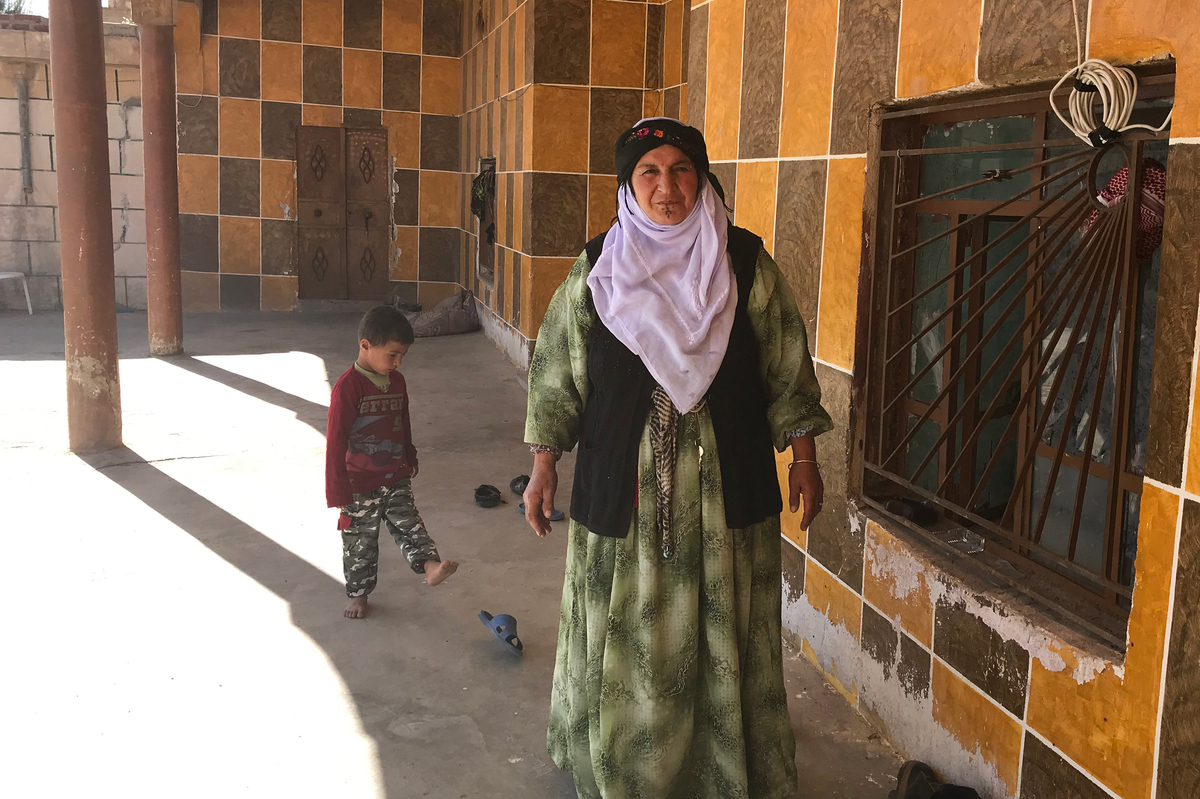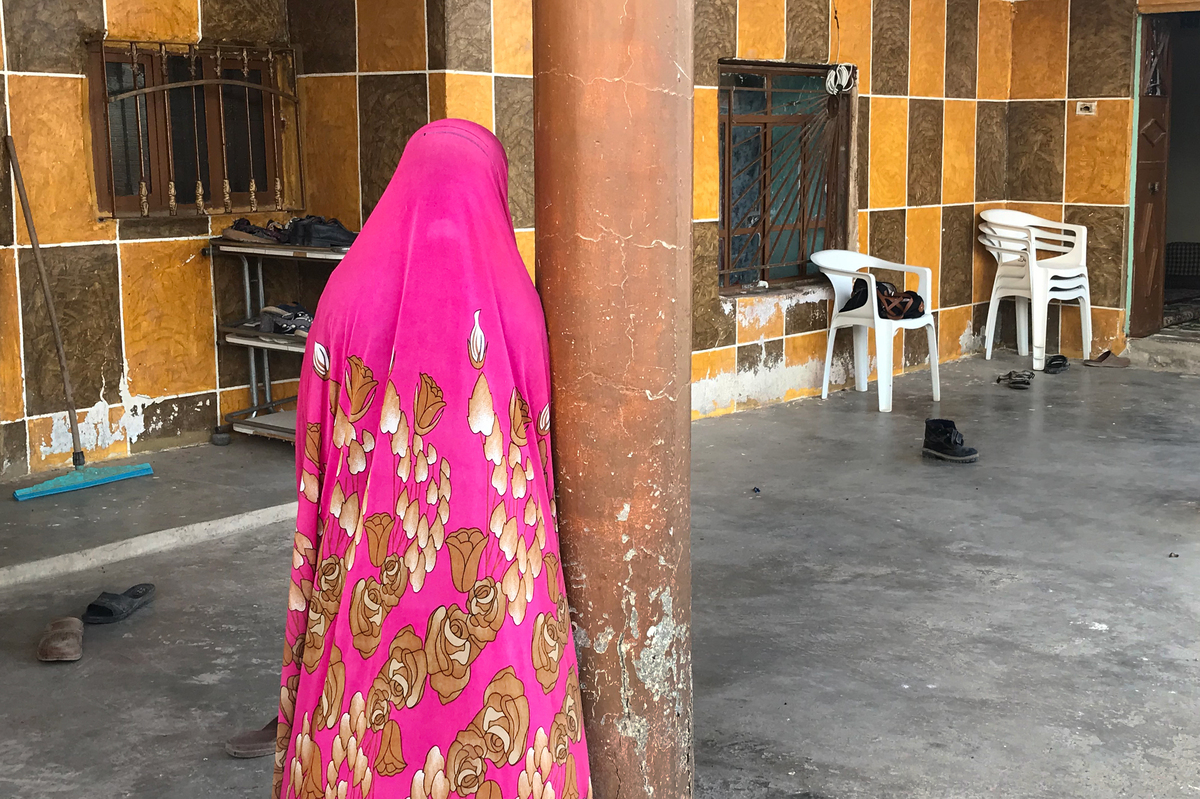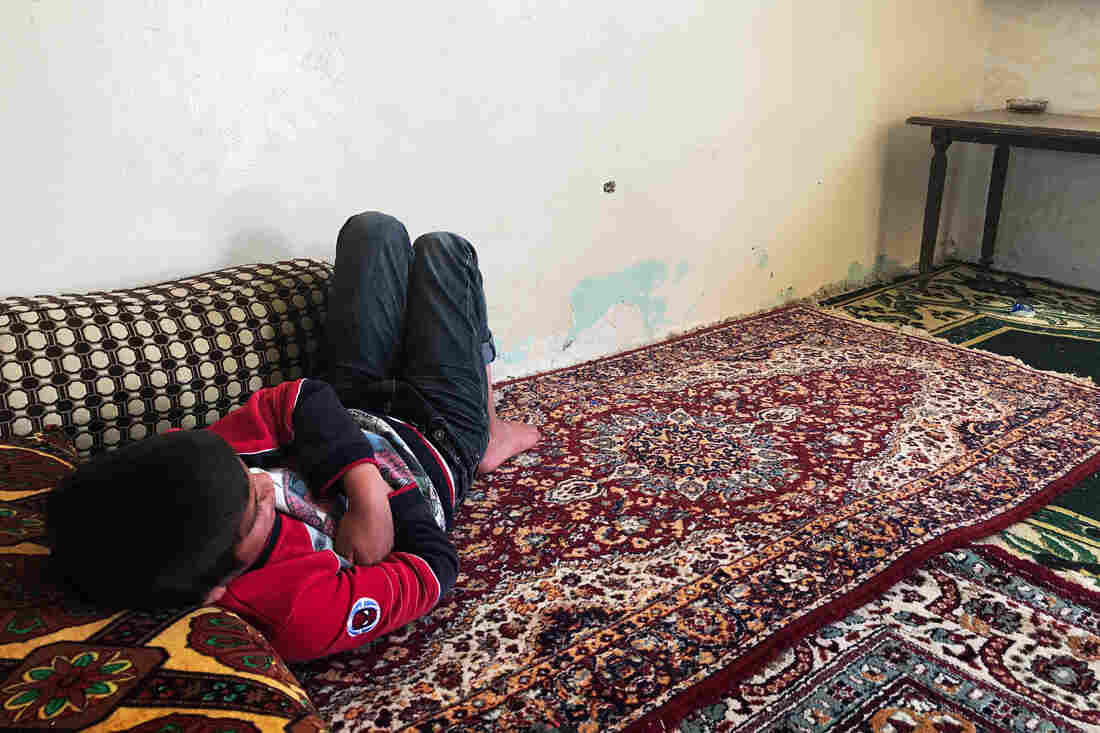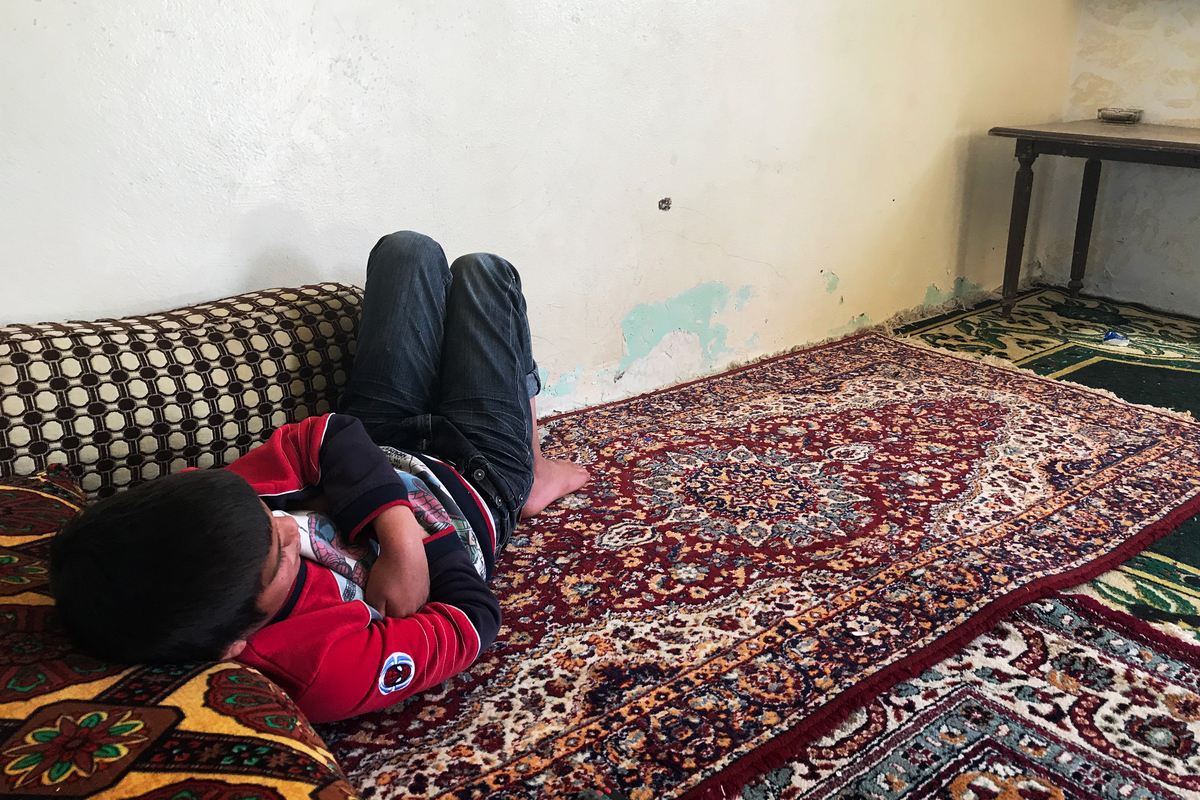girls clothes |
- 'I Want To Go Back': The Yazidi Girls Who Did Not Want To Be Rescued From ISIS - NPR
- They wanted a son so much they made their daughter live as a boy - CNN
- Two Irish Teens Are Youngest Ever Convicted of Murder There - The New York Times
| 'I Want To Go Back': The Yazidi Girls Who Did Not Want To Be Rescued From ISIS - NPR Posted: 19 Jun 2019 06:23 AM PDT  Zahura Sinan with a grandchild. She and her son's family have taken care of almost 150 Yazidi women and children rescued from ISIS. Jane Arraf/NPR hide caption  Zahura Sinan with a grandchild. She and her son's family have taken care of almost 150 Yazidi women and children rescued from ISIS. Jane Arraf/NPRZahura Sinan passes around wrapped candy to guests sitting on carpets in the family's living room in a village in northeastern Syria. It's to celebrate the first day of freedom for two Yazidi girls, liberated from the ISIS family who held them captive for two years. "This is like their birthday," says Sinan's son Mahmoud Rasho, the Yazidi official who found the girls in a detention camp for ISIS families. For now, his family is taking care of the girls at their home near the city of Hasakah. The rescue of two Yazidi girls — who survived a genocide that saw more than 1,000 killed and an estimated 5,000 more from this ancient religious minority held hostage — would normally be a joyous occasion. But these girls didn't want to be rescued. Jeelan, 11, sits with her head bowed and her arms wrapped around her knees, a patterned brown-and-white scarf that had covered her hair wrapped around her thin shoulders like a shawl. "I want to go back to Um Ali," she whispers, referring to the Iraqi woman who had been pretending in camp that the girls were her daughters. "Um Ali is my real family."  Jeelan, 11, the day after being rescued from an ISIS family who had held her captive for the past two years. She says she doesn't remember her Yazidi family. "I want to go back to Um Ali," she says, referring to the Iraqi woman who had been pretending to be her mother in a detention camp for ISIS families. "Um Ali is my real family." Jane Arraf/NPR hide caption  Jeelan, 11, the day after being rescued from an ISIS family who had held her captive for the past two years. She says she doesn't remember her Yazidi family. "I want to go back to Um Ali," she says, referring to the Iraqi woman who had been pretending to be her mother in a detention camp for ISIS families. "Um Ali is my real family." Jane Arraf/NPRHer friend Watfa, 10, sits across the room, wearing sweatpants and a long-sleeved T-shirt in the heat and looking forlornly at the floor. "I don't want anything except to go back to Um Ali," she says. To protect their privacy, NPR is not using the girls' surnames. Um Ali is the only name the girls know for the woman they consider their surrogate mother. The girls speak in Arabic, learned from their ISIS captors. They've forgotten the Kurdish dialect spoken by Yazidis. And in these early days, still mourning the loss of the only mother they've known for the past two years, they say they don't want to go back to families they barely remember. Rasho found them in the sprawling al-Hol camp through information from another Yazidi girl he'd rescued there a week earlier. The overcrowded camp is home to more than 80,000 Syrians, Iraqis and other foreigners — most of them families of ISIS fighters.  Watfa, 10, the day after she was freed from the ISIS family holding her. Watfa was raised as a Muslim for the past two years and says she doesn't remember much about being Yazidi. Jane Arraf/NPR hide caption  Watfa, 10, the day after she was freed from the ISIS family holding her. Watfa was raised as a Muslim for the past two years and says she doesn't remember much about being Yazidi. Jane Arraf/NPRRasho believes there could be hundreds of captive Yazidis still with ISIS families. They include those too afraid to declare themselves Yazidi, women who gave birth after being raped by ISIS fighters and who do not want to give up their children — and some who were so young when they were taken captive, they have forgotten who they are. Rasho, who holds an elected position in the Kurdish-led regional administration of northeastern Syria, had gone back to al-Hol the previous night, before midnight, with a female camp guard, under the guise of checking documents. Members of the group he was with blocked the entrance and exit of the large tent where Um Ali and the girls were living with dozens of other families. "There was a woman who said, 'Those are my girls,'" Rasho says, referring to Um Ali. "I said, 'Come with your girls.' We went to the camp directorate." Watfa and Jeelan were 5 and 6 when they were kidnapped. Neither remembers her own last name. Rasho sent their photos to contacts in the Sinjar region of Iraq, where their families are from, and within 10 minutes the children had been identified. The girls had a few minutes in the office to say goodbye to a tearful Um Ali before Rasho took them away, sobbing. Jeelan and Watfa had been kidnapped with relatives but then were separated from them. They were being kept at a guesthouse for ISIS fighters when Um Ali, a widow, took them to live with her two years ago. "She was selling girls. She was marrying them off when they were two or three years older than these girls," says Rasho. But Jeelan and Watfa saw her only as a maternal protector. They don't remember being kidnapped by ISIS. Jeelan says Um Ali took them in when they had no one to care for them. "She raised me. She would tell me, 'This is OK — this is not OK. This is good, this is not good,'" she says through tears. Um Ali taught her how to read and write. 'She was nice to us," Watfa says. Rasho asks Jeelan if she remembers Sinjar in Iraq, and if she wants to see her family — her father, her brother and sister, waiting for her there. She says no.  On the roof of his home, Mahmoud Rasho places a video call for Watfa, 10, to allow her to talk to her relatives in Canada. Her mother, who was also held captive by ISIS, has been admitted as a refugee in Canada. Jane Arraf/NPR hide caption  On the roof of his home, Mahmoud Rasho places a video call for Watfa, 10, to allow her to talk to her relatives in Canada. Her mother, who was also held captive by ISIS, has been admitted as a refugee in Canada. Jane Arraf/NPRYazidi girls and young women don't cover their hair, but Jeelan says she likes wearing the niqab — a black cloak that covers everything but the face — because "God says we need to wear it." She and Watfa have never seen TV. They used to watch a program on a cellphone about the lives of the prophets. The two girls say they don't remember anything about being Yazidi. They talk of following the Quran and seem to consider themselves practicing Muslims. They ended up at the camp earlier this year, after the terror and hardship of the last days of the ISIS caliphate — airstrikes, mortars and near-starvation, as U.S.-backed Kurdish forces battled the group that had once controlled tens of thousands of square miles in Iraq and Syria. Despite that, Jeelan says life was easier with her ISIS family than it is now. "More normal," she says. She doesn't understand these unfamiliar people, Yazidis, who claim they are her people. Rasho and his family have opened up their home to almost 150 Yazidi women and children rescued from ISIS — some of them wounded; all of them traumatized. He and his wife and mother take care of them until the freed women and children obtain approval from Kurdish authorities to cross the border back to Iraq. "Don't cry, Jeelan. Don't cry," Rasho's teenage daughter Haya, dressed in jeans and a pink T-shirt, tells the rescued girl. She tells the girls they will get them new clothes. Jeelan cries even more. Rasho says when some rescued children go back to their families in Sinjar, they insist on wearing the niqab and saying Muslim prayers five times a day. He says this phase passes. A Yazidi boy, rescued by Rasho a few days earlier from the al-Hol camp, lies sprawled on a foam mat in front of a television, entranced by cartoons. He was 7 years old when he was enslaved by an Iraqi ISIS fighter, who put him to work as a shepherd and regularly beat him. Now 12, Haval has a ready smile and chipped front teeth. Despite the horror he has been through, he seems to be adjusting. He doesn't speak Kurdish anymore, but says when he was alone, he used to remind himself that he was Yazidi and think of the village where he came from. "Sometimes I would talk to myself about Sinjar, but I made sure they didn't hear me," he says.  Haval, 12, watches TV. The Yazidi boy was rescued from the al-Hol camp and is waiting to be reunited with an older sister in the Sinjar region of Iraq. Jane Arraf/NPR hide caption  Haval, 12, watches TV. The Yazidi boy was rescued from the al-Hol camp and is waiting to be reunited with an older sister in the Sinjar region of Iraq. Jane Arraf/NPRHis few Yazidi friends either disappeared or were killed in airstrikes. After that, he didn't have anyone to talk to about Sinjar. When he wasn't in the fields looking after sheep and goats, sometimes he would sit in his room and cry in secret, thinking about his family. Haval says the ISIS family he was with kept trying to teach him the Quran. "I acted like I can't learn," he says. "They told me, 'When you grow up, you will fight the Americans.' I would say 'yes, yes,' but in my mind I would say 'no.' " Haval is from a village near Kocho, the site of the worst massacre of the ISIS genocide against Yazidis in Iraq's Sinjar region. Hundreds of men and older boys were rounded up and shot there in 2014. Haval's family was captured by ISIS when their car broke down as they were trying to escape to Sinjar mountain. Haval has no news about his father and mother, and a brother who is still missing. He saw one of his sisters — a few years older than him, she was bought and sold by a series of ISIS fighters — just once in Baghouz, the Syrian village where ISIS made its last stand. "They brought her to me and we sat for a little while," he says. "And then they took her away." They asked each other if they had heard any news about the rest of the family. They hadn't. The ISIS fighter who owned his sister drove her away on a motorcycle. Haval says he ran after them, crying, until he fell down in the street. But now she is free and Haval is desperate to see her. She is waiting for him in Sinjar. In a video call with another sister, now in the Netherlands, he asks again if there is any news of their parents. There isn't. Rasho takes Watfa outside and up the stairs to a windy rooftop, where the reception is better for a video call with her mother and other relatives, now living in Canada. "You don't know Kurdish?" one of the relatives keeps asking. "You have to speak Kurdish, no Arabic." "They love you and they want to talk to you," Rasho tells Watfa later. "Aren't they better than Um Ali?" "No," she says. But she is smiling now. Haya tells Watfa they can watch cartoons together — or a Bollywood film. The girls have never seen one. Instead, Watfa puts on a pink outfit that completely covers her hair and body, to recite Islamic prayers. Jeelan retrieves the black niqab she was rescued in the night before. She clutches it anxiously and then puts it on, a serene smile on her face. Haya takes the younger girl's hand reassuringly. It's hard now, says Rasho. But after a month at home, he's confident the girls will remember who they were before ISIS. |
| They wanted a son so much they made their daughter live as a boy - CNN Posted: 18 Jun 2019 09:18 AM PDT [unable to retrieve full-text content]They wanted a son so much they made their daughter live as a boy CNN In Afghanistan's deeply patriarchal society, sons are highly valued over daughters -- to the point where some parents dress their girls as boys in a centuries-old ... |
| Two Irish Teens Are Youngest Ever Convicted of Murder There - The New York Times Posted: 19 Jun 2019 04:30 AM PDT  DUBLIN — A Dublin jury found two 14-year-old boys guilty on Tuesday in the killing of a teenage girl last year, the youngest people ever to be convicted of murder in Ireland. In a case that has shocked and horrified the nation, the two boys, who were both 13 at the time of the killing, were found to have murdered Ana Kriegel, 14, whom they had lured to an abandoned house on the outskirts of the town of Lucan, a Dublin suburb. Her naked body was found in the house three days after she had been reported missing, with over 50 separate injuries. A state pathologist testified that there was evidence of compression of her neck, but that the likely cause of death was blunt trauma to her head and neck, possibly from blows from a bloodied stick and concrete blocks found near her body. One teenager, known as "Boy A" because of legal restrictions on reporting identities in underage cases, was convicted of murder and aggravated sexual assault after the police found his semen on clothes torn from the girl's body. The victim's blood was also found on his shoes and on items from what the police called a "murder kit" — kneepads, gloves, shin-pads, a scarf and a homemade horror mask found in a backpack in Boy A's home. The prosecution said that the other child, "Boy B," lured Ana to the murder scene and watched the assault. Her father, who was home at the time, testified that Boy B had called at their house on the night of the murder, and that his daughter had gone out with him, promising not to be long, although they were not friends. Boy B was convicted largely on the basis of admissions and lies he made to police interrogators, and closed circuit images and witness testimony from around the time of the attack. The two boys will be sentenced on July 15. While life sentences are mandatory in Irish law for adults in cases of murder, juveniles are treated differently. In preparation for the sentencing, the presiding judge, Paul McDermott, has asked for probation, psychiatric and school reports on the two boys, which will be used, along with character witnesses and statements from those close to the victim, as guidelines. The circumstances of Ana Kriegel's short life and brutal death have made the case particularly disturbing for a country with little experience of premeditated murder by teens. Born in Siberia in 2004, she was adopted two years later from a Russian orphanage by Patric and Geraldine Kriegel, a retired French professor and his Irish-born wife, an employee of the Irish state railway network. They brought her back to their home in Lucan, a pleasant suburb on the western edge of Dublin. They kept her original first name, Anastasia, and raised her to be aware of her Russian past and culture. A tall, striking girl who excelled at swimming, modeled in a school fashion show and loved singing and dancing, Ana also encountered learning difficulties stemming from poor eyesight and a childhood tumor that left her virtually deaf in one ear. Her parents, who attended every day of the trial in Dublin's Central Criminal Court, said that while she craved friendship, she had few friends outside her family and had been ruthlessly bullied and sexually harassed for being different from others at her high school. She had started to self-harm, they said, and at one point was caught sending herself bullying messages from a fake social media account. Despite her behavioral problems, she remained a fun-loving and lively child, and was close to her supportive parents and family. Her mother, returning from work on the evening of the girl's death, immediately became alarmed when she learned that Ana had gone off alone with Boy B, who she knew was not a friend of her daughter. Boy A later told the police that he had sent Boy B to fetch Ana because he knew that she was interested in him and wanted to tell her "gently" that he was not interested in her. Shortly after the killing, which the police believe happened immediately after Ana entered the room in the abandoned farmhouse, Boy A was seen crossing a local park with injuries to his arm and leg and cuts to his face. Big for his age and with some martial arts training, he claimed to have been attacked by two men. The police believe that Ana inflicted the injuries as she fought desperately for her life. Both boys were supported by parents and family during the four-week trial. The father of Boy B turned angrily on those in the court after the verdict, insulting them and sarcastically applauding the conviction of "an innocent boy." Boy A's parents wept and hugged their son before he was led away. The last word in the case, until the sentencing next month, went to the victim's parents, who spoke briefly with reporters outside the courthouse. "Ana was a dream come true for us, and she always will be," Geraldine Kriegel said. "She will stay in our hearts, forever loved and forever cherished. We love you, Ana." |
| You are subscribed to email updates from "girls clothes" - Google News. To stop receiving these emails, you may unsubscribe now. | Email delivery powered by Google |
| Google, 1600 Amphitheatre Parkway, Mountain View, CA 94043, United States | |








0 Yorumlar